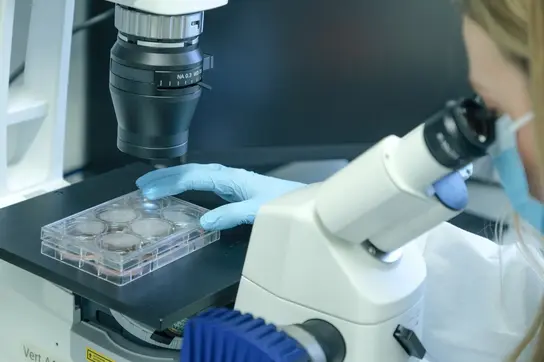Scientific Core Facilities and Services
Scientists at DKFZ and its partner sites have access to a broad portfolio of research infrastructures, including Core Facilities, as well as data management and IT-services. Core Facilities provide access to cutting-edge instrumentation, user support, and technology development. Data management and IT-services address IT infrastructure needs and offer tools for organizing and managing research data properly.

News from our Core Facilities

On February 24, 2025, a hands-on workshop on HORIZON™ software by Lunaphore Technologies (a Bio-Techne brand) will take place at DKFZ. HORIZON is an intuitive software suite designed to analyze antibody-based spatial proteomics data generated with the COMET™ system, enabling actionable multi-omic insights in just a few clicks.
The workshop is aimed at users who want to efficiently analyze spatial proteomics data and will include practical exercises using example datasets.
Date: February 24, 2025, 9:00 AM–2:00 PM
Location: ATV building, seminar room A0.106, ground floor
Organized by: Single-cell Open Lab, DKFZ
Host: Jan-Philipp Mallm, Ph.D.
Registration is required. Please indicate during registration whether you can bring your own Windows laptop.
Registration:
https://lunaphore.com/our-events/dkfz-heidelberg-horizon-workshop/
In March 2026, the NGS Core Facility at DKFZ will offer two hands-on training courses on the Galaxy bioinformatics platform. The courses are open to DKFZ internal researchers and aim to support reproducible and intuitive analysis of next-generation sequencing data.
Practical Introduction to the Galaxy Bioinformatics Platform
18 March 2026 | 09:00–17:00
DKFZ main building, 8th floor, room H824
This one-day introductory course provides an overview of the Galaxy platform, including data import, management of large datasets, and basic analysis workflows using NGS data. It is particularly suited for researchers who are new to Galaxy.
Practical RNA-Seq Analysis in Galaxy
19 March 2026 | 09:00–17:00
DKFZ main building, 8th floor, room H824
This course focuses on RNA-Seq data analysis in Galaxy, with a strong emphasis on differential gene expression analysis using DESeq2. Participants will learn key steps ranging from quality control and read alignment to result visualization and interpretation.
Familiarity with the Galaxy platform is strongly recommended.
Registration: These are DKFZ internal courses. Registration is available via the DKFZ internal training portal. A limited number of places are still available.

Did you know? The DKFZ Core Facilities are now on LinkedIn! We share exciting insights into our technologies, updates, and news from the Core Facilities.
Follow us and stay informed:
DKFZ Core Facilities and Services are listed below according to their area of specialty.
Genome, Epigenome & Transcriptome
The NGS Core Facility provides highly parallel DNA and RNA sequencing services based on the Illumina MiSeq, NextSeq and NovaSeq technologies as well as on the Oxford Nanopore technologies.
More info about the Next Generation Sequencing Core Facility
The Microarray Core Facility provides state-of-the-art microarray technologies for Expression Profiling, Methylation Analysis, Genotyping/Copy-Number-Variation(CNV). High-throughput protein analysis utilizing cutting-edge Olink® technology, kinase activity profiling as well as assisted access to ddPCR and qPCR instruments and Ingenuity are also part of our service portfolio.
The Single-cell Open Lab provides an infrastructure for processing cells, preparing libraries for single-cell sequencing as well as spatial omics.
The Preclinical and Translational Pathology offers an infrastructure for services along the entire histological workflow - from sample preparation and various staining methods to the digitization of sections.
More information about the Preclinical and Translational Pathology
Proteome
The unit provides mass spectrometry based Proteomics. State-of-the-art hardware in combination with specialized workflows allows most sensitive and in-depth Proteome analysis.
The Single-cell Open Lab provides an infrastructure for processing cells, preparing libraries for single-cell sequencing as well as spatial omics.
The Microarray Core Facility provides state-of-the-art microarray technologies for Expression Profiling, Methylation Analysis, Genotyping/Copy-Number-Variation(CNV). High-throughput protein analysis utilizing cutting-edge Olink® technology, kinase activity profiling as well as assisted access to ddPCR and qPCR instruments and Ingenuity are also part of our service portfolio.
The Antibodies Core Facility offers the production of monoclonal (mouse/rat) antibodies using the hybridoma technology and the production of polyclonal (guinea pig) ABs. In addition the Antibodies Core Facility offers antibody sequencing, engineering and recombinant expression.
The Preclinical and Translational Pathology offers an infrastructure for services along the entire histological workflow - from sample preparation and various staining methods to the digitization of sections.
More information about the Preclinical and Translational Pathology
Metabolome
The Metabolomics Core Technology Platform (MCTP) is a core facility of Heidelberg University and officially collaborates with DKFZ. It is localized within the Centre for Organismal Studies. We offer a broad range of qualitative and quantitative metabolomics services from diverse sample matrices to all DKFZ groups as internal users.
Cellular and Preclinical Imaging
The Electron Microscopy Core Facility performs experiments in full service for ultrastructural studies by TEM as well as SEM.
The Light Microscopy Core Facility offers a variety of advanced imaging-related services at several locations on the campus. We provide consultation, hands-on training, technical support and open access (24/7) to cutting-edge instrumentation and a broad range of applications.
The Small Animal Imaging Center supports users in the application of numerous radiological methods such as ultrasound, optical imaging, µPET, µCT, µSPECT and MRT measurements to collect and quantify morphological and functional data in vivo.
The service Unit for Radiopharmaceuticals and Preclinical Studies provides consultation and support in imaging and irradiation design/irradiation for preclinical studies as well as in experimental design for animal studies.
More info about the Service Unit for Radiopharmaceuticals and Preclinical Studies
Cytometry and Screening
The Immune Monitoring Unit supports oncology studies (IITs or industry-sponsored studies) of all phases using various state-of-the-art immunological analysis techniques.
The Flow Cytometry Core Facility advises and supports scientists in the planning, execution and evaluation of flow cytometry analyses and cell sorting. Modern instruments (analytical instruments and cell sorters) as well as various software are available for this purpose.
More info about the Flow Cytometry Core Facility
The Chemical Biology Core Facility (CBCF) offers infrastructure and expertise for high throughput screenings of small molecules against biological targets of interest. Support and consultancy are provided for assay development, especially suited for high-throughput experiments. Thus the aim of the CBCF is to enable research groups to identify and develop small active compounds which will be essential for addressing biological questions and/or being starting points for drug development.
More info about the Chemical Biology Core Facility
Whole Tissue Analysis
The Immune Monitoring Unit supports oncology studies (IITs or industry-sponsored studies) of all phases using various state-of-the-art immunological analysis techniques.
The Light Microscopy Core Facility offers a variety of advanced imaging-related services at several locations on the campus. We provide consultation, hands-on training, technical support and open access (24/7) to cutting-edge instrumentation and a broad range of applications.
The Single-cell Open Lab provides an infrastructure for processing cells, preparing libraries for single-cell sequencing as well as spatial omics.
The Preclinical and Translational Pathology offers an infrastructure for services along the entire histological workflow - from sample preparation and various staining methods to the digitization of sections.
More information about the Preclinical and Translational Pathology
Reagents and Resources for Cancer Research
The Antibodies Core Facility offers the production of monoclonal (mouse/rat) antibodies using the hybridoma technology and the production of polyclonal (guinea pig) ABs. In addition the Antibodies Core Facility offers antibody sequencing, engineering and recombinant expression.
The Cellular Tools Core Facility offers standardized vector and clone resources as well as modular services for cell-based gain- and loss-of-function technologies.
The Dieter Morszeck Biorepository is a fully automated cold storage facility in which valuable liquid biospecimens can be stored.
More info about the Dieter Morszeck Biorepository
The service Unit for Radiopharmaceuticals and Preclinical Studies provides consultation and support in imaging and irradiation design/irradiation for preclinical studies as well as in experimental design for animal studies.
More info about the Service Unit for Radiopharmaceuticals and Preclinical Studies
Animal Services
The Center for Preclinical Research (ZPF) advises and assists researchers in the design and realization of their animal experiments. It consists of four subdivisions: Central Animal Laboratory, Tumor Models, Microbiological Diagnostics and Transgene Service.
Research Data Management
The Omics IT and Data Management Core Facility (ODCF) provides high-throughput computing, data management and basic bioinformatics services to groups at the DKFZ and their collaborating partners.
More info about the Omics IT and Data Management Core Facility
Library and IT Services
The Information Technology Core Facility (ITCF) is responsible for optimum usage of IT at DKFZ, for supporting staff of all departments in matters of choosing IT tools for their special needs as well as for providing central IT Services and support which are essential for everyone at DKFZ.
The Library provides among other things scientific literature and information needed by the scientists of the German Cancer Research Center.
Enabling Technology Department
The Enabling Technology Department is headed by the Chief Enabling Technology Officer Prof. Elisa May. She oversees the following Core Facilities: Antibodies, Cellular Tools, Chemical Biology (with EMBL), Dieter Morszeck Biorepository, Electron Microscopy, Flow Cytometry, Light Microscopy, Microarray, Next Generation Sequencing, Proteomics, Single Cell OpenLab, Small Animal Imaging, and the Scullery. The Department is also involved in two projects on biomage data management: the DFG project "Information Infrastructure for BioImage Data Management – I3D:bio", and the consortium "NFDI4BioImage" in the National Research Data Infrastructure NFDI, where Prof. May serves as a Co-Speaker.
-
-
-
-

Dr. Christian Schmidt
Scientific Project Manager and Research Data Management Microscopy
+49 6221 42 2657 -




